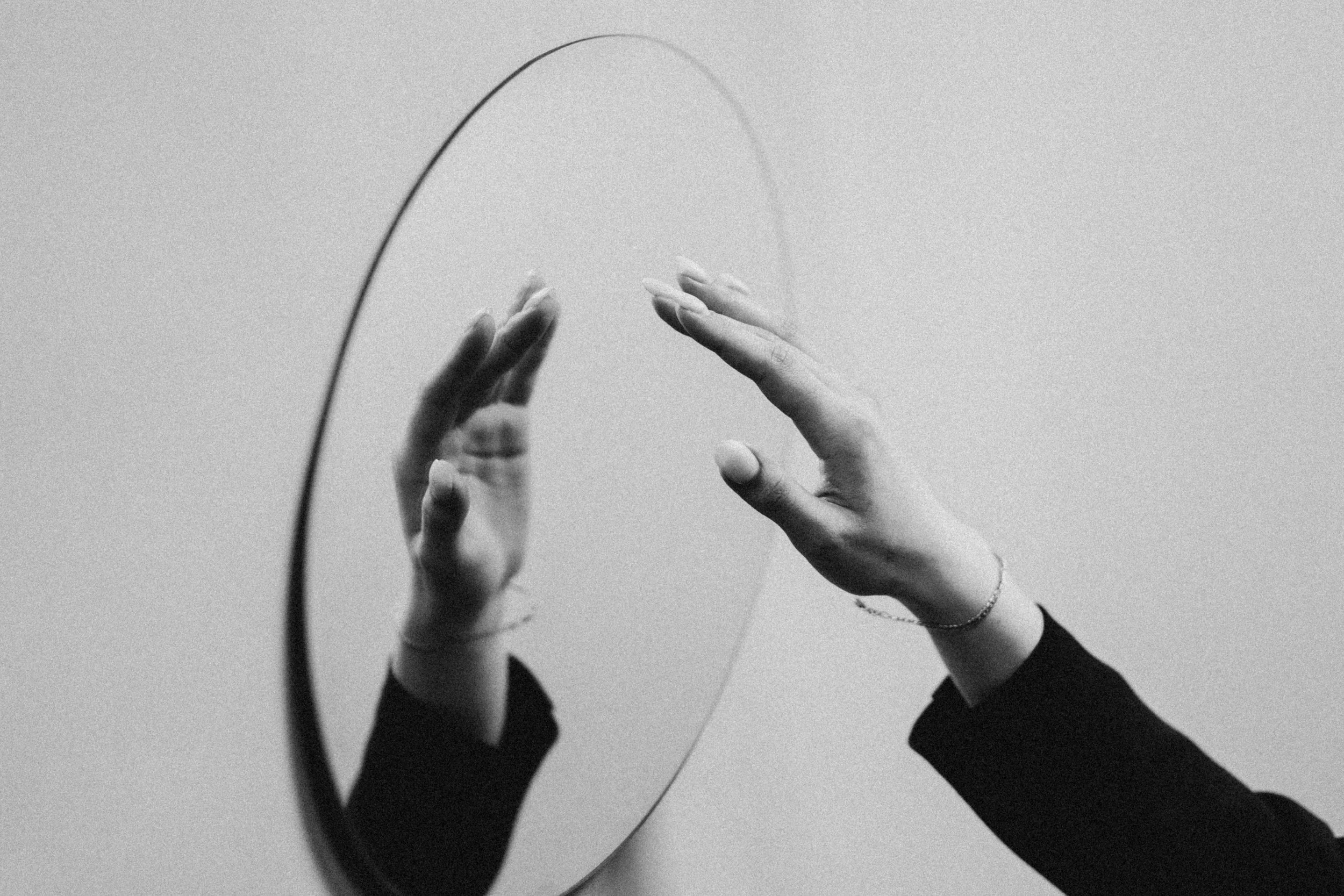
Self-Image from the Inside Out:
Repairing Self-Image Through Depth Psychology
by Lyna Tevenaz Jones, M.A., ACMHC
Self-Image from the Inside Out: Repairing Self-Image Through Depth Psychology Workshop
Online Workshop
Reprogramming our self-image is often an integral part of the individuation process—especially when early internalized messages have created a distorted mirror of who we are.
Until these inherited imprints are revisited and reorganized, the psyche remains locked into outdated roles and flawed narratives. Individuation requires returning to these roots, not to erase them, but to transform their meaning—so that our self-perception ceases to be a reflection of wounds and becomes a reflection of our true self authenticity.
Self-image is hardwired into our brain: it acts as a perceptual filter.
Our self-image colors how we unconscious perceive ourselves and life.
Our self-image is formed very early on, at the intersection of our childhood memories, parental gaze, social messages, and the roles we had to assume to be accepted.
Often, these early imprints continue to operate in the shadows, dictating our automatic thoughts, our bodily reactions, and our inner boundaries.
This webinar offers you a journey of inner exploration to understand, revisit, and transform these foundations.
What you will discover:
-How your self-image was formed in childhood and why it continues to influence your choices today.
-The invisible mechanisms that fuel doubt and self-worth... and how to deprogram them.
-Powerful tools to rewrite your memories, transform your beliefs, and soothe your body.
-The role of small challenges experienced in the present in proving to your brain that you are capable and worthy.
-Why each revisited memory and each new experience opens a path to healing and lasting confidence.
-How to reconstruct a positive self-image from a Jungian lens
-Meaning-making strategies
Reframing the Mirror: Transforming Self-Image
Our self-concept—how we see ourselves and what we believe about who we are—form the foundation of our mental health, relationships, and overall life satisfaction.
Can we truly transform the way we see ourselves—healing a fragmented or critical self-image into one of wholeness, self-compassion, and authentic confidence?
For many of us, the wounds of early life didn’t simply fade with time—they were woven into our sense of who we are, surfacing unexpectedly in moments of self-doubt, perfectionism, social comparison, or chronic feelings of inadequacy.
The absence of attuned mirroring, the lack of emotional safety, or the silence when we needed someone to say, “I see you, I believe in you, you matter”—these moments leave imprints in our nervous system, our emotional memory, and our self-concept.
Contemporary clinical research affirms what depth psychology has long understood: our sense of self is built through both self-regulation and co-regulation—requiring experiences of connection with others, as well as practices that help us calm and center ourselves internally. Both are necessary to rewire insecure patterns and cultivate a stable, cohesive sense of self.
In my studies and clinical work, I have found that integrating approaches from Self Psychology, Winnicottian theory, attachment theory, Jungian psychology, and Internal Family Systems (IFS) offers a powerful framework for repairing the negative self-image we may have carried since childhood. By combining these perspectives, we can access implicit memory, process unmet needs, and begin to internalize new, compassionate ways of relating to ourselves.
In my personal and clinical work, I also observe two main defense mechanisms around self-image: idealization of others’ bodies and devaluation of one’s own appearance. These two common and unconscious defense mechanisms are rooted in shame, early attachment wounds, and distorted self-concept. When someone idealizes another person’s body—whether a friend, influencer, or celebrity—they project traits such as beauty, perfection, or worth outward onto others. This serves to avoid confronting internal feelings of inadequacy or defectiveness.
Self-Image from The Inside Out is designed as an experiential journey that draws on these rich theories and clinically proven methods. Together, we will explore how to shift from a self-image rooted in criticism or shame to one based on understanding, acceptance, and genuine self-worth—so you can feel more secure, confident, and connected to your true self.
Why are our Self-Image and our Self-Concept So Important?
Our self-image (how we see ourselves) and self-concept (the beliefs we hold about who we are) form the foundation of our mental health, relationships, and overall well-being. When our self-image is stable and positive, we feel more confident, resilient, and capable of handling life’s challenges. We’re better able to set healthy boundaries, pursue meaningful goals, and form secure, fulfilling relationships.
On the other hand, a distorted or fragile self-image—often shaped by early relational experiences, trauma, or social comparison—can lead to chronic self-criticism, low self-esteem, anxiety, depression, perfectionism, and difficulties with intimacy or asserting needs. It can cause us to question our worth, feel like imposters, or stay stuck in patterns of people-pleasing or self-sabotage.
Clinically, research shows that our self-concept affects:
Emotional regulation—how we process and recover from difficult feelings.
Attachment—how securely we connect to others and tolerate closeness.
Identity—our sense of purpose, values, and stability.
Motivation—the confidence to set and achieve goals.
A healthy, integrated self-image helps us move through the world with a sense of I am enough—not perfect, but worthy and capable—creating a foundation for psychological flexibility, satisfying relationships, and authentic self-expression.
What to expect…
This workshop is a psychoeducational experience designed to deepen your understanding of how self-image and self-concept are formed, distorted, and repaired. Rather than a guided meditation or visualization session, this workshop focuses on clinically grounded insights and practical strategies you can use to begin transforming the way you see yourself.
Here is what you can expect from the presentation:
Theoretical Foundations
A concise but comprehensive exploration of how self-image develops from a psychological perspective, drawing on Self Psychology, Winnicottian theory of the true and false self, attachment theory’s insights on secure and insecure patterns, Jungian concepts of persona, shadow, and archetypes, and Internal Family Systems’ (IFS) model of inner parts. We will discuss how early relationships and social influences shape our self-concept and why some people develop harsh, unstable, or fragmented self-images.The Steps of Active Imagination.
The Dynamics of Negative Self-Image
We will break down how internalized critical voices, unmet attachment needs, perfectionism, and social comparison reinforce patterns of low self-worth—and how these patterns can be gently challenged and rewired.
Clinical Strategies for Rebuilding Self-Concept
Presentation of practical, research-informed methods you can apply to support a healthier sense of self, including:
Increasing self-awareness of old patterns
Shifting from self-criticism to self-compassion
Engaging in self-reflective exercises to clarify your true values, strengths, and identity beyond appearance or external validation.
The Ascending Spiral
Meeting your own Myth
Meaning-making
About me
Lyna Tevenaz Jones is a psychodynamic and Jungian-informed therapist specializing in depth work with adults and adolescents. In my clinical work, integrate attachment theory, internal family systems, archetypal psychology, and affective neuroscience. My thesis research explored how symbolic imagery and active imagination can restore connection to the Self in the healing of childhood trauma and attachment wounds.
🔍 What You’ll Learn
The Self-Image is rooted in how we were mirrored by attachment figures
Our sense of self doesn’t form in isolation—it develops through relationships, especially the early mirroring we received (or didn’t) from caregivers. You’ll explore Heinz Kohut’s concept of selfobjects—people or experiences that help build a cohesive self—and how deficits in empathic mirroring can leave us with a fragile or critical self-image. Understanding this helps normalize why you might still struggle with self-worth today, even if your life looks successful on the outside.
Restoring the Cohesive Self
Drawing on Ernest Wolf’s clinical contributions in Treating the Self, we’ll discuss how therapy and conscious inner work can provide emotionally corrective experiences that gradually strengthen the self by giving it what it missed in early development—attunement, acceptance, and emotional resonance. You’ll learn how this process helps reestablish a cohesive, stable self-image.
The Power of Symbolic Thinking to Reshape Self-Concept
Building on Jungian and Winnicottian ideas, we’ll explore how our inner world communicates through image, metaphor, and symbolic narratives—not just rational thought. These unconscious stories about who we are can keep us stuck in cycles of shame and self-criticism—or, when explored with compassion, become doorways to transformation.
How Early Experiences Wire the Brain and Self-Concept
Modern neuroscience confirms what Self Psychology and depth theories have long taught: our brains encode relational experiences into emotional memory. When selfobject needs go unmet, our nervous system learns to expect rejection or criticism, wiring patterns of self-doubt and distorted self-perception. We’ll explore how emotionally meaningful, attuned experiences—whether with others or within ourselves—can begin to rewire these patterns and create a more positive self-image.
Why Self-Compassion is More Effective than Self-Criticism
We’ll discuss research showing that self-compassion, not perfectionism, is the key to lasting motivation, emotional regulation, and healthy self-image. You’ll learn tools to identify critical inner voices, unblend from them (using IFS-informed strategies), and offer yourself the kind of support that fosters secure self-worth.
Integrating the Persona and the Shadow
Drawing from Jung, we’ll look at how the persona (the social mask) and shadow (the parts we disown) interact to shape self-image. By understanding and integrating these dynamics, you can move toward a more authentic, stable sense of identity—one rooted in your true self rather than external expectations.
Building a Living Relationship with the Self
Finally, you’ll learn how to cultivate a sustaining relationship with your Self—what Kohut called the nuclear self—as a reliable source of inner security, mirroring, and guidance. This relationship allows your psyche to reorganize around truth, worthiness, and authentic self-esteem, rather than outdated wounds or social pressures.
Why this is important
Your self-image and self-concept—how you see yourself and what you believe about who you are—form the foundation of your mental health, relationships, and life satisfaction. When these are fragile, overly negative, or based on outdated messages from childhood, they can lead to chronic self-doubt, anxiety, depression, perfectionism, and unfulfilling relationships.
Healing and strengthening your self-image and self-concept helps you develop a stable, compassionate sense of self—so you can move through life with greater confidence, resilience, and authentic connection to your true worth.
Photo by Михаил Секацкий on Unsplash
Self-Image & Self-Concept: A Depth Psychological and Neurobiological Approach
Join this 90-minute interactive workshop exploring how our sense of self—our self-image and self-concept—is formed, distorted, and repaired. Drawing on Self Psychology, Winnicottian theory, attachment theory, Jungian concepts, and Internal Family Systems (IFS), this presentation bridges clinical insight with symbolic depth to offer a powerful pathway toward healing and transformation.
Rooted in depth psychology and supported by modern neuroscience, this workshop will help you understand why so many of us carry critical or unstable views of ourselves—and how to begin creating a more cohesive, compassionate sense of self.
You’ll learn:
How early relationships shape the self-image and self-concept we carry into adulthood.
How people often use defense mechanisms to manage shame or anxiety related to body image (e.g., projection, denial, idealization of others’ bodies, devaluation of their own).
Why negative self-image persists even when external circumstances improve.
How symbolic thinking, archetypes, and imagery impact emotional memory, identity, and self-worth.
The role of the limbic system, autobiographical memory, and the brain’s Default Mode Network in maintaining or transforming self-concept.
Why emotionally meaningful, symbolic, and relational experiences can rewire self-perception more effectively than logic or willpower alone.
The impact of modern society on women’s self-image and how to protect our psyches against societal injunctions.
This workshop offers a unique integration of clinical research, psychological theory, and experiential tools to help you move beyond outdated self-criticism and begin cultivating an authentic, confident relationship with yourself.
Refund policy for sessions
Please note that all registrations are final and non-refundable.
Depth psychology values commitment and containment. When someone signs up, it’s often part of a deeper, unconscious process—a psyche-level contract. A no-refund policy reinforces the idea that once a commitment is made, the work begins, even if resistance or ambivalence surfaces later.
No changes, transfers, or cancellations will be accepted once you have registered. In the unlikely event that the workshop is canceled, you will be contacted via email and offered an alternative of equivalent value.
For any questions regarding our policies, feel free to reach out at lyna@womenofdepthpsychology.com.
What you get:
Full workshop recording,
35-slide PDF presentation that captures the key insights
12-page inner-work prompts workbook to help you integrate the material into daily life.
Price: $45
Taking good care of your psyche and your body.
This lecture is intended for educational and self-reflective purposes only and is not a substitute for individual therapy or professional mental health treatment.
By participating, you acknowledge that any emotional material that may arise is your responsibility to process, and it is strongly recommended that you engage in ongoing personal therapy for deeper integration. While care has been taken to create a safe and thoughtful experience, I am not liable for any psychological discomfort or triggering that may occur. Please honor your own boundaries and seek support from a licensed therapist if needed.
The unconscious is not neutral; it carries both light and shadow, and engaging with it requires reverence, humility, and a grounded internal container. For this reason, we will not be practicing active imagination together live.


